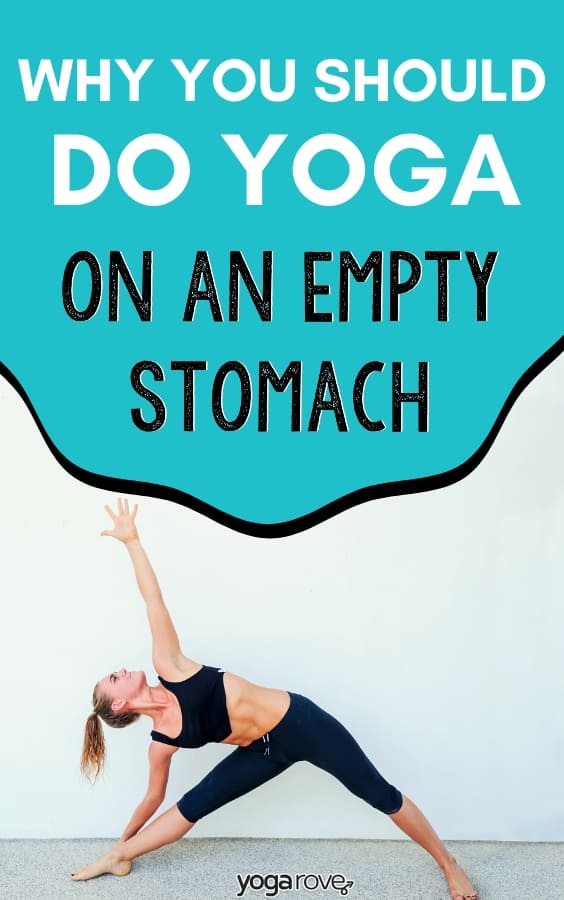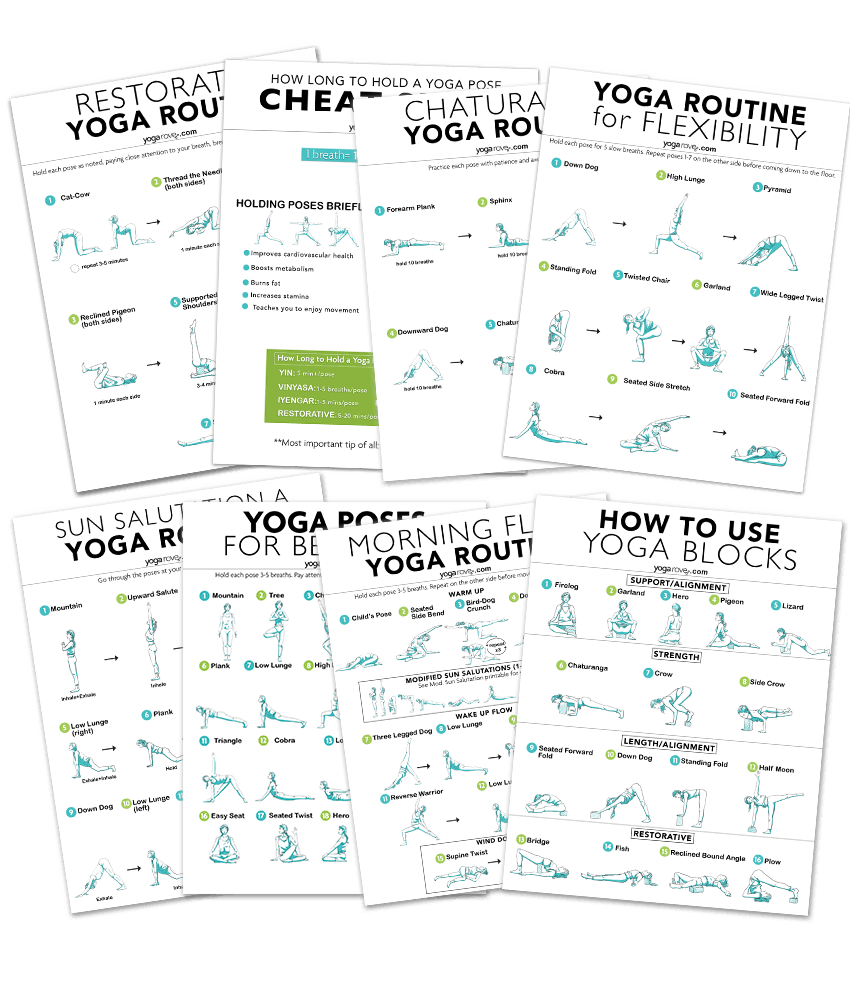This post may contain affiliate links. Please read our disclosure for more info.
Over 5 years of yoga practice, I’ve heard many opinions about whether to practice yoga on an empty stomach. Some teachers say it’s necessary, some say it’s not, others say that it’s more important to eat the right breakfast. I decided to research it for my own practice and share my findings with you!

Should you practice yoga on an empty stomach? Practicing yoga on an empty stomach is the best approach to get the most out of a yoga practice. This means eating the last big meal 4 hours before with the option to have a light snack up to 1 hour before.
That said, nourishing our body empowers a deeper yoga practice. There are simple guidelines around when & what to eat that will take your practice to the next level!
Reasons Why You Should Practice Yoga on an Empty Stomach:
Because Your Body Needs Time & Energy to Digest Food
Experts agree that practicing yoga on an empty stomach is one of the most important preparations for practice. Generally, it’s best to avoid eating for 1 – 2 hours before asana or pranayama (breathing exercises). For most people, it’s okay to have a heavy meal four hours before practice.
Digesting takes a lot of energy that your body needs during practice. When food is in your digestive tract, your body sends energy to the tissues to help them process the food & move it throughout the gastrointestinal system. Energy helps your body absorb nutrients, too.
As always, it’s best to listen to your body to determine exactly how long to wait between eating and practice. Factors like metabolism speed influence how fast you digest. If you have a health concern like hypoglycemia, diabetes, or IBS, consult with a doctor or health professional to determine how best to manage eating before yoga practice.
Doing yoga poses takes energy away from the digestive process. This means your body doesn’t process the nutrients fully & food might get stuck rather than moving along. It can leave you bloated or gassy. There’s a reason a reason there is a pose nicknamed Wind-Releasing Pose!
A Full Stomach means a Less Effective Practice
Having food in the stomach or intestines takes up space in the abdomen. This makes it harder to do poses like twists or forward bends where the abdomen compresses. And… it’s heavier! Inversions like headstand or shoulderstand get harder with a heavy belly.
An empty stomach gives plenty of space for the abdominal walls to extend and contract within poses. You’ll get a deeper stretch in spinal extension and a more intense twist. Your body will flow through Vinyasas more easily and lift lightly into those tricky inversions.
You can also feel nauseous or have to run to the restroom as a result of having food/drinks in the belly. I’ve found myself thinking “Uh oh…” when the teacher announces that it’s backbend day and I ate just before class. It’s harder to concentrate when nature calls or the stomach is upset. On the other hand, we easily fall into the flow of class if our body’s needs are satisfied.
Eating before practice can be counterproductive for yogis who want to use the practice to lose weight. According to CureJoy, practicing on an empty stomach provides the body the chance to “efficiently harness the energy from the energy reserves of the body… such as fat.” Burning fat rather than food will fast-forward weight loss.
Intermittent Fasting Leads to More Weight Loss
One of the main reasons to work out in the morning in a fasted state is because we would want the body to use our stored fat as energy instead of relying on food. If you were to eat and then work out the body will focus more on the energy you just put into your body as opposed to your fat.
Yoga is one of the best intermittent fasting morning workouts because it is easy on the body. In a fasted state it is very hard to focus on high impact or cardio workouts because of the amount of energy the body burns at such a high intensity.
If you do not know much about intermittent fasting for weight loss you need to check out our guide right now. We go over what it is, the many benefits involved, and how it can help you lose weight without adding any exercise. This is the single most important method you can add right away to your life and you will start seeing the results within a couple days.
How long should I wait after eating to practice yoga?
Sri K. Patthabi Jois, founder of the Ashtanga Yoga lineage and B.K.S. Iyengar, founder of the Iyengar Yoga lineage would recommend waiting four hours after you eat to practice yoga. This ensures that the body has fully digested and can devote 100% of its resources to performing asana and pranayama. And, there’s zero chance of a full belly inhibiting flexibility or muscular movement.
However, if you’re like me and you have to eat more often to keep your energy up, it’s a smart idea to have a snack two hours before class. Protein-packed nuts, a bowl of fruit, or a glass of plant milk is a great option. I’ve found myself feeling faint during class if I last ate more than four hours before, especially in longer classes.
It’s best to space beverages to be 45 minutes before practice to give your body time to process & eliminate them before starting off. Moisture-packed fruits like watermelon and grapes, too. These are excellent choices to add in to our diet the night before class or during lunch when you’re taking a night class to ensure that you’re hydrated when on the mat.
What to Eat Before Yoga in the Morning
Wholesome, plant-based foods will jumpstart your morning yoga practice. Plant-based foods break down more easily than animal proteins, meaning less gas and burps. It’s also best to stick to lighter foods rather than a heavy meal first thing. Overall, it’s about the morning meal giving you energy and focus for your upcoming class.
A nutritious, well-balanced meal with healthy fats, fiber, carbohydrates, and a reasonable amount of glucose will provide you with sustained energy.
Ideas for a heavenly breakfast:
- Fresh fruit with muesli or granola and plant milk: Fruit is packed with antioxidants & vitamins. Plus, the natural sugar’s a nice boost in the AM. The muesli or granola provides slow-release carbohydrate energy to fuel you for longer. Plant milk is easier on the tummy than cow milk.
- Smoothies: A super yummy, customizable way to start the day. Smoothies are nutrition-packed and easy to digest. Add greens for fiber, fruit for vitamins, or plant milk / nut butter for protein.
- Sauteed veggies + your favorite plant-based protein: Warm & fast, perfect for winter! Greens have fiber and vitamins like iron & folate. Sautéed tofu, tempeh, or plant-based sausage will give you power.
- Oatmeal with nuts & dried fruit: Nuts offer protein & healthy fats good for brain function. Dried fruits for a zip of energy. Oatmeal for sustained power with low-glycemic carbs.
Foods & Beverages to Avoid Before Yoga
- Avoid heavy, oily, greasy, fried foods, and big portions of meat up to six hours before class. They’re tougher to digest and tend to sit in the intestine longer. They can also make you feel tired – the opposite of what you want when you’re diving into practice.
- Raw vegetables like celery, cauliflower, and beans are high in complex carbohydrates. They can give you gas or bloating when uncooked because they’re difficult to digest.
- Large amounts of raw greens like spinach or kale have a similar effect. Breaking these foods down by boiling, sautéing, or steaming makes them perfectly light, nutritious before-yoga foods.
- Processed foods are a no-go before yoga. They often have lots of simple or high-glycemic carbs that cause blood sugar to crash. Otherwise, they contain large amounts of sodium or processed sugars. They’re hard on the digestive system & unlikely to give the sustained energy required for yoga. Watch out for “sugar alcohols” on the labels of your favorite energy bar – they’re a huge cause of bloating!
- Spicy foods are a major culprit of lack of focus during practice. They cause heartburn, especially tough in any class with inversions. Spicy foods also contribute to rajasic energy in the body; in Ayurveda, this energy is fiery, passionate, aggressive, and unfocused! Rajasic energy raises the heart rate, makes you sweat more, and makes the mind jump around rather than focusing on the breath or the teacher.
Can I have coffee before yoga?
Whether you have coffee before yoga depends on your constitution. Coffee can give a much-needed energy boost before an early morning practice. On the other hand, coffee speeds up the heart rate & can be dehydrating or cause stomach upset.
If coffee’s on the menu, try to have it 1 to 2 hours before practice. That will give your body time to process the caffeine while avoiding the crash.
The traditional yogis say that all stimulants are to be avoided for yoga practice, including coffee. It is said to create a busy mind and to disrupt the subtle energy in the body. This can prevent the practitioner from accessing the deepest internal spaces while practicing.
Though these days many yoga practitioners take a flexible stance to consuming caffeine. If it works for you, do it – just be balanced about it.
Like all things in life, a happy, balanced body is most important when eating or drinking before yoga practice. Eat and drink in a way that works for your body and the practice will be fulfilling.
Related Questions
What should I eat before Ashtanga Yoga?
Ashtanga Yoga is a physically demanding practice that involves engaging the bandhas (muscles & energy within the body). Most Ashtanga practitioners practice on 100% empty to give their body the resources it needs to engage muscles & bandhas properly.
How long after yoga should I wait to eat?
Give yourself at least 15 minutes before consuming food after you practice yoga so it can come back into it’s normal, calm, awake state. You should always practice Savasana after yoga to relax the mind and body after a highly physical practice before eating. Eating food right away will shock your system and we wouldn’t want any of that happening.
Can you drink water before and during yoga?
Yes! Especially if you are practicing Hot Yoga, you want to keep yourself hydrated during the practice. Just be sure not to gulp it down to fast, as it may cause nausea when you go to do certain poses like inversions.






